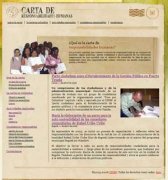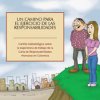
 Relatórios
Relatórios
 Leituras sobre o conceito de responsabilidades
Leituras sobre o conceito de responsabilidades
 Parceiros
Parceiros
Ver em linha
 SITIO INTERNET REGIONAL - Carta de las Responsabilidades Humanas, Colombia - Por una ciudadanía responsable
SITIO INTERNET REGIONAL - Carta de las Responsabilidades Humanas, Colombia - Por una ciudadanía responsable 
 Unión de Ciudadanas de Colombia
Unión de Ciudadanas de Colombia  Centro de Investigación y Educación Popular - CINEP
Centro de Investigación y Educación Popular - CINEP Colômbia
Os artigos nesta seção não são traduzidos ainda, você podem lê-los em inglês.
The International Congress of Bogota: Focus on the Charter of Human Responsibilities por Manfred Rosenberger, 1º de julho de 2009The International Congress, organized in Bogota from April 20 to 24, 2009, gathered for the first time more than 800 participants, including 50 international famous experts, to discuss with Colombians from the political sector, from universities, the medias and the civil society as well as with officers. The debates were built on the cosigned principles of the "Charter of Human (...) |
|
Presentation of the Charter to Colombian officers, May 2008 por Gustavo MARIN, 19 de junho de 2008The Charter of Human Responsibilities was presented to the 300 officers of the Colombian Military Academy during the mission carried out in Colombia in May 2008 in the context of the work to build a global alliance of military personnel, by Gustavo Marin (Programme Director at the FPH and Director of the Forum for a New World Governance), with the French General (retired) Patrice Mompeyssin, (...) |
A Citizens’ Pact to Strengthen Public Management and Active Citizenship in Puerto Tejada, Cauca , 7 de junho de 2006A municipal-administration and citizens’ commitment. The result of a working process with a group of citizens coordinated by the social organization Foro por Colombia, Valle Chapter, and supported by the CINEP, the Citizens’ Pact to Strengthen Public Management and Active Citizenship is a symbol for the community of Puerto Tejada.
For three months (January-March 2006), a group of thirty (...) |
The Charter of Human responsibilities in Colombia: a strategy for empowering civil society por Claire LAUNAY, Diego ESCOBAR, 2 de junho de 2005Lille, December 2001: the text of a Charter for Human responsibilities is presented to 400 citizens from 120 countries and 25 social and professional backgrounds during the closing ceremony of the World Assembly organised by the Alliance for a Plural, Responsible and United World. Ethics, individual and collective responsibility, dignity, sustainable peace and common good are at the root of (...) |
Objectives and strategies por Claire LAUNAY, Diego ESCOBAR, 20 de abril de 2005The Charter of Responsibilities must enable civil society to develop its own capacity for organisational and institutional empowerment and change stereotypes of political action that have existed up until now. Civil society must, in fact, contribute to the creation of a new type of governance by, for instance, reinforcing mechanisms of control over the communication media and over the (...) |
Increasing awareness, Stimulating Appropriation por Claire LAUNAY, Diego ESCOBAR, 8 de abril de 2005Educational and social methods |
Difficulties por Claire LAUNAY, Diego ESCOBAR, 5 de abril de 2005The distributed budget.
We find ourselves in Colombia in a situation different from that of the other members of the Committee. We, in fact, began the work of disseminating the Charter early, i.e. in July 2003, in response to a call for initiatives and thus received an initial sum to make headway with the work. The debate within the Charter’s Steering Committee over voting methods and budget (...) |
Contacts , 8 de março de 2005; Tania Patiño ; |
 Methodological booklet for action and reflection on the Charter
Methodological booklet for action and reflection on the Charter
